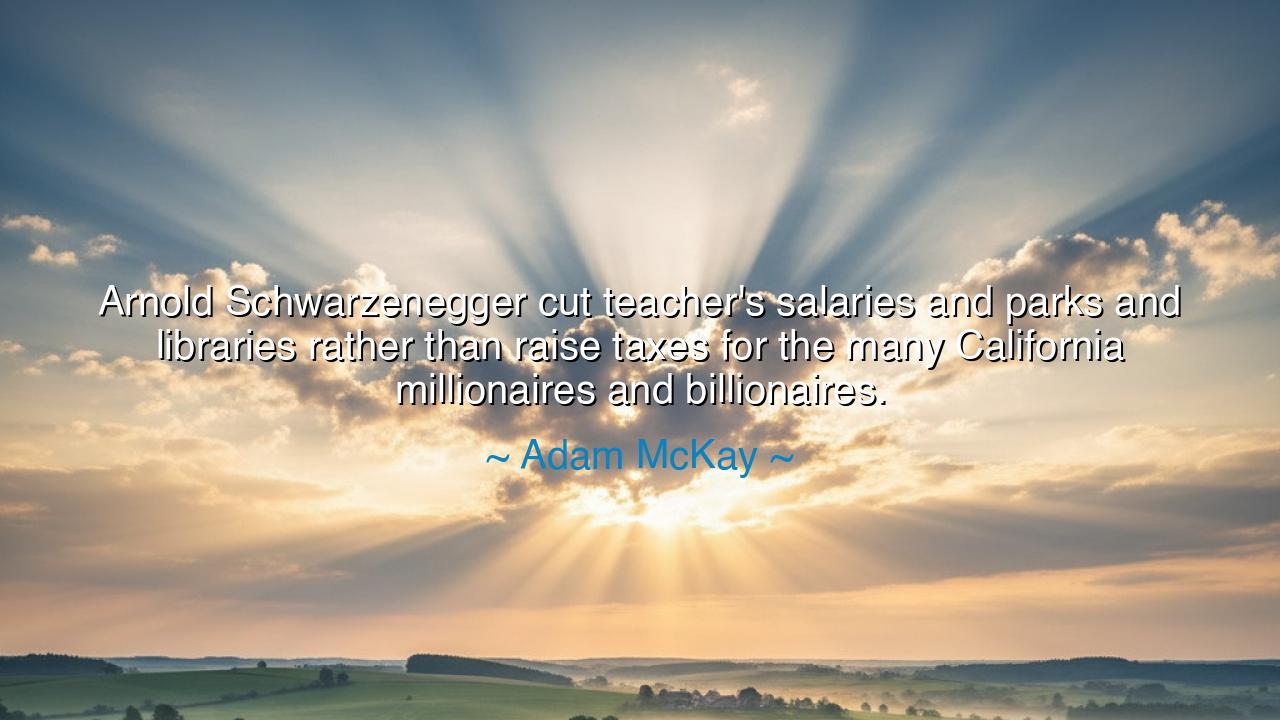
Arnold Schwarzenegger cut teacher's salaries and parks and
Arnold Schwarzenegger cut teacher's salaries and parks and libraries rather than raise taxes for the many California millionaires and billionaires.






Adam McKay, with the fire of indignation, once declared: “Arnold Schwarzenegger cut teacher's salaries and parks and libraries rather than raise taxes for the many California millionaires and billionaires.” These words, though tied to a moment in politics, resound as an eternal cry about the choices of power, the burdens laid upon the weak, and the privilege preserved for the strong. They reveal the old truth: that a society shows its values not by what it proclaims, but by whom it chooses to protect and whom it chooses to sacrifice.
The meaning of this reflection lies in the tension between public good and private wealth. Teachers, parks, and libraries are the lifeblood of a community, nurturing minds, bodies, and spirits. To cut them is not simply to reduce expenses; it is to strike at the very heart of the common life. McKay contrasts this with the abundance of millionaires and billionaires, who could have borne the weight of taxation. The choice, then, was not necessity but priority: to shield wealth rather than strengthen the pillars of community.
The origin of such dilemmas stretches deep into human history. In Rome, as the empire strained under debt, emperors levied heavy taxes on the provinces while sparing the wealthiest elites of the capital. Bread and circuses distracted the masses, but the foundations of education and civic life eroded. Eventually, the empire, having neglected its people while preserving its aristocracy, collapsed under its own corruption. McKay’s words echo this timeless warning: when leaders abandon the common good to serve the privileged, decay is never far behind.
History gives us other examples of the power of such choices. Consider the Great Depression of the 1930s. Many governments clung to austerity, cutting social programs and deepening suffering. Yet in America, Franklin Roosevelt’s New Deal chose a different path: to invest in schools, libraries, parks, and public works, believing that uplifting the people was the surest road to recovery. Though controversial, these decisions built not only jobs but dignity, and their legacy endures in institutions that still serve the nation. The contrast between these two paths — austerity for the poor, or responsibility for the wealthy — defines the struggle McKay names.
The heart of his statement also unveils the sacred truth of teachers and public institutions. Teachers are not merely employees; they are guardians of knowledge, builders of character, planters of seeds that will grow for generations. Parks and libraries are not luxuries; they are sanctuaries where the spirit of community breathes. To cut them for the sake of preserving wealth is to proclaim that short-term gain outweighs the long-term flourishing of the people. It is to deny the sacred covenant that binds leaders to those they govern.
The lesson for future generations is this: judge your leaders not by their speeches, but by their budgets. Words may flatter and distract, but budgets reveal priorities. Ask always: do they protect the vulnerable, or the powerful? Do they strengthen schools, libraries, and parks, or do they weaken them while guarding private fortunes? For in these choices lie the fate of nations. A society that invests in its people will endure; a society that abandons them will crumble.
Practical action must follow. Defend teachers, support libraries, preserve parks. Demand that wealth serve the common good, rather than the reverse. Participate in the civic life of your community, for silence is the ally of neglect. Teach your children that justice is not measured by how the rich are treated, but by how the poor are uplifted. And hold leaders accountable, for their duty is not to the few but to the many.
Thus, Adam McKay’s words stand not only as a critique of one moment, but as a warning carved in the stone of history. When wealth is preserved at the expense of teachers and public life, the soul of a people withers. But when sacrifice is shared and the common good is honored, society flourishes, and generations yet unborn are blessed. Let this wisdom be carried forward: that to protect the humble is greater than to serve the mighty, and that the measure of a nation is found in the strength of its schools, its libraries, and the joy of its children playing in parks.






AAdministratorAdministrator
Welcome, honored guests. Please leave a comment, we will respond soon